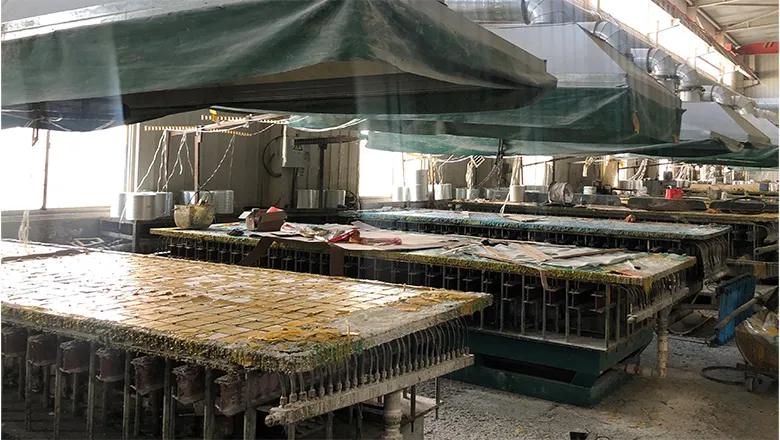loading...
- No. 9, Xingyuan South Street, Dongwaihuan Road, Zaoqiang County, Hengshui, Hebei, China
- admin@zjcomposites.com
- +86 15097380338
- Welcome to visit our website!
FRP Filter Vessel for Effective Fluid Separation and Filtration Applications
Understanding FRP Filter Vessels A Comprehensive Overview
FRP (Fiberglass Reinforced Plastic) filter vessels have gained significant traction in numerous industries, thanks to their unique combination of efficiency, durability, and resilience. These vessels are primarily used in various filtration applications, including water treatment, chemical processing, and food and beverage manufacturing. This article delves into the characteristics, advantages, and applications of FRP filter vessels, shedding light on why they are increasingly preferred over traditional materials.
What is an FRP Filter Vessel?
An FRP filter vessel is a storage tank or filter designed to separate contaminants from liquids or gases. The primary material, fiberglass reinforced plastic, consists of a composite material made from a polymer matrix reinforced with fibers. This construction provides the vessel with unparalleled strength while keeping it lightweight and resistant to corrosion.
FRP filter vessels come in various shapes and sizes, tailored to meet specific industry needs. They can house different types of filter media, including activated carbon, sand, and other filtration aids, allowing for versatile applications across various settings.
Key Advantages of FRP Filter Vessels
1. Corrosion Resistance One of the standout features of FRP is its inherent resistance to corrosion. Unlike metal counterparts, FRP filter vessels do not rust or corrode when in contact with harsh chemicals or saline environments. This property significantly extends the lifespan of the vessel, resulting in reduced maintenance costs and downtime.
2. Lightweight Design FRP filter vessels are much lighter than traditional metal vessels, making them easier to transport and install. The reduced weight does not compromise strength or durability, which is a significant advantage in various industrial settings where heavy materials can pose challenges.
3. Thermal Insulation Fiberglass materials have excellent thermal insulation properties. This characteristic is vital in industries requiring temperature control during filtration processes. By minimizing heat transfer, FRP vessels help maintain the stability of the liquid or gas inside, leading to improved filtration efficiency.
frp filter vessel

4. Cost-Effective While the initial investment in FRP filter vessels can be higher than that of conventional materials, the long-term savings on maintenance, repairs, and replacement parts often outweigh these costs. Their durability results in fewer replacements over time, making them a cost-effective solution in the long run.
Applications of FRP Filter Vessels
The versatility of FRP filter vessels makes them suitable for a wide range of industries
- Water Treatment FRP vessels are commonly used in municipal and industrial water treatment facilities. They effectively remove solids, organics, and other contaminants from drinking water and wastewater, ensuring compliance with health standards.
- Chemical Processing The resistance of FRP vessels to corrosive chemicals makes them an ideal choice for chemical manufacturing processes. They are used for storing and processing various chemicals where traditional materials would fail.
- Food and Beverage Industry In this sector, FRP filter vessels are utilized for filtration tasks, such as removing impurities from liquids and ensuring product quality. Their non-reactive nature ensures that the integrity of the food or beverage is maintained.
- Marine Applications Due to their resistance to saltwater corrosion, FRP filter vessels are often found in marine environments, including onboard ships and offshore platforms, to filter seawater and other liquids.
Conclusion
FRP filter vessels represent a significant advancement in filtration technology, combining durability, corrosion resistance, and lightweight design to meet the diverse needs of various industries. As industries increasingly focus on efficiency and sustainability, the adoption of these vessels is expected to grow. Their applications in water treatment, chemical processing, and food and beverage production demonstrate their versatility and reliability. Understanding the benefits and applications of FRP filter vessels is crucial for industries looking to optimize their filtration processes and ensure longevity in their operations.
-
The Rise of FRP Profiles: Strong, Lightweight, and Built to LastNewsJul.14,2025
-
SMC Panel Tanks: A Modern Water Storage Solution for All EnvironmentsNewsJul.14,2025
-
GRP Grating: A Modern Solution for Safe and Durable Access SystemsNewsJul.14,2025
-
Galvanized Steel Water Tanks: Durable, Reliable, and Ready for UseNewsJul.14,2025
-
FRP Mini Mesh Grating: The Safer, Smarter Flooring SolutionNewsJul.14,2025
-
Exploring FRP Vessels: Durable Solutions for Modern Fluid HandlingNewsJul.14,2025
-
GRP Structures: The Future of Lightweight, High-Performance EngineeringNewsJun.20,2025
